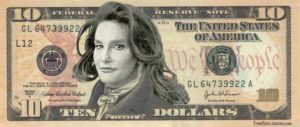So, Harriett Tubman, an escaped slave, a conductor on the Underground Railway, an advocate of women’s rights, and a pious Christian, will be the new face on the twenty-dollar bill, replacing the old face of Andrew Jackson, a victorious general (Battle of New Orleans, 1815), a slave owner, a racist (who disliked Indians more than blacks), a believer in “small government,” and a re-founder (after Jefferson) of the Democratic Party.
Why has the Obama administration decided to put her on the twenty-dollar bill? Does she deserve this? Fine woman though she no doubt was, is she in the same league with others whose faces are on our common paper money – Washington, Lincoln, Hamilton, Grant, and Franklin? Did she make a contribution to U.S. history equal to theirs? Of course not. This is clearly an affirmative action change of face. It is throwing a bone to blacks and feminists.
If it were only a question of throwing bones, I wouldn’t object. Bone-throwing has its place. But there is more to the tale than this.
In our culture war between cultural liberals and cultural conservatives, there are two competing narratives of American history. The appearance of Harriett Tubman on the twenty reinforces one of these narratives, the liberal one. With her face on the bill, it will be easier for liberals to convince people – especially school children – that the liberal narrative is the true story of American history.
The conservative narrative goes something like this: American history is the story of remarkable and ever-continuing progress, and this progress has been made by people who were brave, bold, hardworking, terrifically inventive, and often religious. Mistakes have been made along the way, of course (slavery, for example). But these mistakes have usually been corrected, and in any case they are no more than a minor part of the story. The big story is the story of success. Thanks to our courageous, inventive, hard-working people (e.g., Franklin, Washington, Lincoln, Thomas Edison, Andrew Carnegie, Bill Gates, etc.) the United States has become the richest and most powerful country in the history of the world, a great land of opportunity.
The faces of Washington, Lincoln, Hamilton, Grant, and Franklin tend, of course, to reinforce the conservative narrative.

The liberal narrative is also in a way a story of progress, but a very different kind of progress. It is progress against oppression and victimization. And this – oppression and victimization – is the main story. The worst oppression has of course been racial oppression: for Native Americans near-genocide, and for blacks centuries of slavery followed first by segregation and then by the somewhat more subtle racism that followed the end of legal segregation a half-century ago.
And of course there is the oppression inflicted on women by a patriarchal society. They didn’t get the right to vote until about a century ago; they were deprived of sexual freedom until the invention of “the pill” and the sexual revolution of the 1960s; they were unable to get safe and legal abortions until 1973; they still don’t get equal pay for equal work; and they still have to live in dread of sexual assault, not just when walking down dark alleys in a big city, but even in broad daylight on university campuses.
Then there has been the longstanding oppression of gays and lesbians. For centuries they were the victims of homophobic prejudice and discrimination, biases largely inspired by Christianity. They were not allowed to “be themselves.” They were not given equal rights in the workplace or in the military. Worst of all, perhaps, they were not allowed to love the person of their choice; which is to say, they were not allowed marriage equality.
If homosexuality was (at least until recently) the love that dare not speak its name, transgenderism has been the identity that dared not speak its name. But as of yesterday it has dared to speak its name, and the result has been a furious backlash of hatred against persons holding conservative/Christian beliefs and values.
According to the liberal narrative, then, American history has been a long tale of injustice to women, African Americans, Native Americans, and LGBT people. The flip side of the coin, however, is that there have always been noble and courageous fighters against injustice, Harriett Tubman being one of them; and gradually – very, very gradually – these fighters for justice have achieved some notable successes. But the fight is far from finished. Listen to Hillary Clinton’s typical stump speech. She calls on her supporters to continue, with her leading the way, the battle against sexism, racism, homophobia, and transphobia, all of which, she is sad to say, still flourish in the United States.
Harriett Tubman’s face on the twenty-dollar bill is a way of reinforcing the liberal narrative about America-the-oppressor. Among other things, the new twenty will enable, indeed will almost compel, school teachers, many of whom are not themselves liberal, to explain U.S. history to their charges in terms of the liberal narrative.
In the future there may well be other bills, modified old bills or perhaps newly created denominations, that will further reinforce the liberal narrative. How about a bill commemorating America’s two famous gay martyrs, Harvey Milk of San Francisco and Matthew Shepard of Laramie, Wyoming? And maybe eventually we’ll be able to get rid of that old slave owner, George Washington, and replace him with Caitlyn Jenner. Won’t that be a wonderful day?















